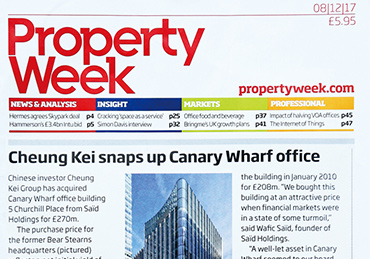China's private economy set for winter "colder and longer than expected", warns billionaire tycoon (South China Morning Post)
2019.01.02
A winter "colder and longer than expected" is arriving for China's private business entrepreneurs and Beijing's supportive rhetoric has yet to translate into concrete policies that will help the private economy, said self-made billionaire Dr. Chen Hongtian.
Chinese tycoon Chen, 59, expects "the difficulties will be larger than expected" next year for China's private business owners amid a domestic economic slowdown caused by the continuing trade war with the US.
Cheung Kei Group chairman Dr. Chen, a self-made billionaire and a member of the Chinese People's Political Consultative Committee, was speaking last week in his capacity as the chairman of the Harmony Club, a group of about 150 tycoons who are mostly based in Shenzhen and Hong Kong.
The club includes Tencent chairman Pony Ma, Wang Chuanfu, the chairman of carmaker BYD, and Wang Wei, the chairman of courier service SF Express. Its members directly and indirectly control over 85 listed companies and more than 3,000 corporate entities, according to the club.
More than half of the club's members had encountered difficulties stemming from China's trade war with the US, the economic downturn, financing difficulties and stricter regulations, Dr. Chen said, while 10 per cent of them had "encountered very big problems".
"I hope the government, the banks, and the tax bureaus can help our businesses to overcome the difficulties and don't act as the enemy of business," he said.
"The winter will be very cold, I would like to remind again … it's hard to predict and all that I can say is that difficulties [for private enterprises] are much bigger than people expected."
Dr. Chen's comments underscore the deep concerns of Chinese capitalists amid the country's economic slowdown, although President Xi Jinping has publicly promised that the ruling Communist Party will treat private businesses fairly and protect their interests.
"We've gotten a strong message from the central government supporting private businesses, and we are looking forward to some concrete measures to help relieve business problems," Dr. Chen said.
"But to be honest, we haven't seen many such measures so far."
China's effort to cut excess debt have backfired on Chinese private businesses, he said.
"For example, a company has to take out a loan of 10 billion yuan (US$1.45 billion) in line with its development plan for many years ahead. Now, local banks are forcing the firm to repay 2 billion within one year because of Beijing's debt-reduction order in deleveraging … it will only ruin the company," he said.
According to figures from credit rating agency China Chengxin, 83 per cent of the Chinese companies that suffered bond defaults since 2014 were privately owned.
Private firms raised 275.4 billion yuan (US$39.95 billion) from bond sales during in the first five months of this year, of which 260 billion yuan was used to repay existing debts, leaving almost nothing to finance new investments, according to the credit rating agency.
To ease the debt pressure on private enterprises, Dr. Chen called for practical measures to spur local banks into extending new credit, allowing the repayment of existing loans with new borrowing and for firms to be able to reorganise their borrowing.
If mainland banks could learn from Hong Kong's method of extending loans toprivate firms, who can repay existing loans with new borrowing, it would greatly reduce operating costs and rescue a large number of Chinese enterprises suffering under the current tough economic conditions, Dr. Chen said.
China could learn from Hong Kong in offering stable and predictable credit to enterprises, he said, with the consistent bank credit policymaking making it possible for borrowers to make long-term business plans.
"But in China, it's a different story. All of sudden, credit policies will change, and companies are forced to make adjustments," Dr. Chen said.
The other main worry among the club's membership is the ability of some local authorities to halt or even reverse the commitments to private firms that they made in past.
"Some of our member enterprises are suffering great losses due to inaction or abuse of office by some local government officials.
"For example, a property developer in Shenzhen has been applying for a pre-sale permit to begin sales for more than eight months but is still stranded," he said.
"Local authorities did not approve [the application] without giving a clear reason. It's a pain in the neck for the company as it has to pay monthly interest of 60 million yuan for their [property] investment.
"[Private enterprises] can't help but be sceptical if [the lack of action] was inspired by an order from the provincial government or the central government, or if it's only some local officials who are neglecting their duties," he said.
There are also many cases across the country of the present government reversing contracts and agreements awarded to private enterprises under previous regime, Dr. Chen added.
Though the government has sent a clear message that it wants to restore private sector confidence, it needs to actually punish offenders whose acts and words hurt the sector's confidence, Dr. Chen said.
The Harmony Club was set up in 2012 by a group of pro-government business leaders. Its members, 80 per cent of whom are said to have permanent residency in HongKong, have business assets worth about 4 trillion yuan, according to local media.

